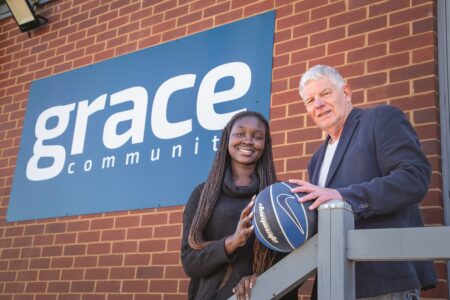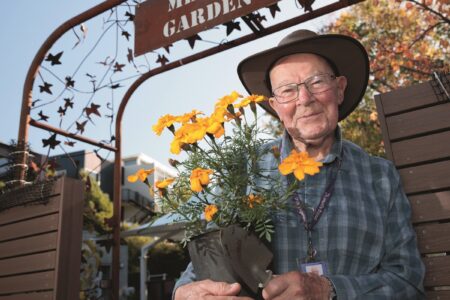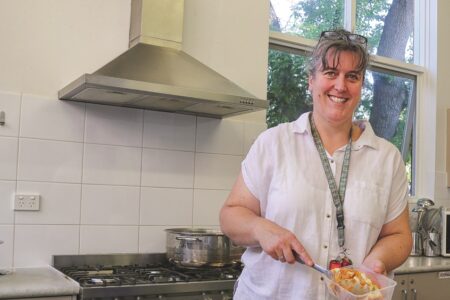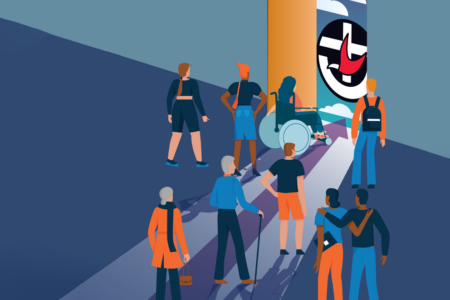For more than 50 years, God’s Squad motorcycle ministry has been reaching out to men considered by many to be outlaws. It provides a much-needed sense of family and church.
By David Southwell
Even at a low throttle the signature throb of a Harley Davison engine announces itself before the bike comes into view.
It’s not just the noise that makes those enjoying a leisurely lunch in the hip, vaguely Greenwich Village surrounds glance up when Peter Whitefield swings a gleaming green Harley into the Melbourne laneway for Crosslight’s photoshoot.
Peter is in full motorcycle club regalia, or colours, including black leathers, bowl helmet and a cut-off jacket covered in sewed-on patches, with largest one on the back displaying black and red medieval-style cross motifs framed by the words “God’s Squad” written in large gothic script.
The classic biker look is completed by Peter’s long, straggly beard and the large tattoos on his beefy right arm.
It’s not normal attire for a Pilgrim Theological College Bachelor of Ministry student, but neither is Peter your stereotypical biker or bikie, terms often used interchangeably although “bikies” normally refers more specifically to members of outlaw motorcycle clubs, also called the “one percenters”.
Peter is a member of the God’s Squad Christian Motorcycle Club, which began in Sydney in the late 1960s as way to reach out to those in motorcycle clubs, both social and outlaw.
God’s Squad gained much of its direction and profile under the charismatic leadership of Rev John Smith who, after founding the Melbourne chapter in 1972, became the club’s national president and an internationally recognised figure.
“John had a group of people around who had the vision to take the Good News to a bunch of people who were very much seen as outcasts of the day, probably a bit like the LGBTIQ community today,” Peter says.
“Out of this there was a ministry that wasn’t just about bike clubs. It was about working with a broad cross section of the community including, for example, Indigenous people at arts festivals such Black Stump.”
Considering the original and most famous outlaw motorcycle club defines its relationship to conventional Christianity and morality in its name, Hells Angels, these groups might seem a particularly unpromising group for Christians to reach out to.
However, Peter, or “Bubba” as he is called by family and friends, says by simply hanging out with bikers and being genuine, the God’s Squad members have come to be widely accepted and even respected.
“We’re friends with each other, we get invited to family events – it’s broader than just the bike club stuff,” he says.
“We’ve been doing that over many years of hard work and it hasn’t always been easy for the people who’ve gone before us, but many bikies will refer to us as priests and, if they need funerals or weddings, they’ll come to us.”
Peter sees a side to outlaw motorcycle clubs, God’s Squad does not call them “bikie gangs”, that might not be immediately apparent to those whose main perception of the one-percenters comes from lurid news reports of drug running and gang warfare or ultraviolent TV shows such as Sons of Anarchy.
“There’s a sense of family, for many of them it is their family,” he says.
“You’ll get young men, often who’ve grown up in foster care, who don’t have family or their family relationships have been strained so they’ve found another family.
“For many of them it is a place of safety, it is a place to go to. They don’t want to go out hang out on the streets of Melbourne, they want to go hang out together.
“Some of the clubs, when they have their club meetings they call that church. Their church family might be the only family they have.”
The Melbourne clubhouse of God’s Squad is based at an actual church, St Martins Community Church in Collingwood, where the club holds closed members-only meetings and open meetings, which Peter says can attract up to 50 people.
Next year Peter, 59, will be celebrating 20 years of being a fully badged God’s Squad member, which requires three-year probation style period of being a nominee, the equivalent of being a “prospect” in normal outlaw motorcycle parlance.
Peter grew up doing plenty of bush bash motorbike riding in Gippsland, but coming from a very conservative Open Brethren household he might not have been considered a natural choice to join the unusual ministry of God’s Squad, even though his family knew John Smith.
“God’s Squad had been a calling that had been a long time in coming, but I’ve always felt a heart for the underdog,” he says.
However, Peter does not believe bikers are the outcasts they used to be and argues that, as with young Africans, the statistics show the percentage overall crime of perpetrated bikers is small and can easily be overblown.
“Look, we’re not naïve enough to not know that some of this other stuff is going on, but I don’t think that, by and large, bike clubs are set up to be criminal organisations,” he says.
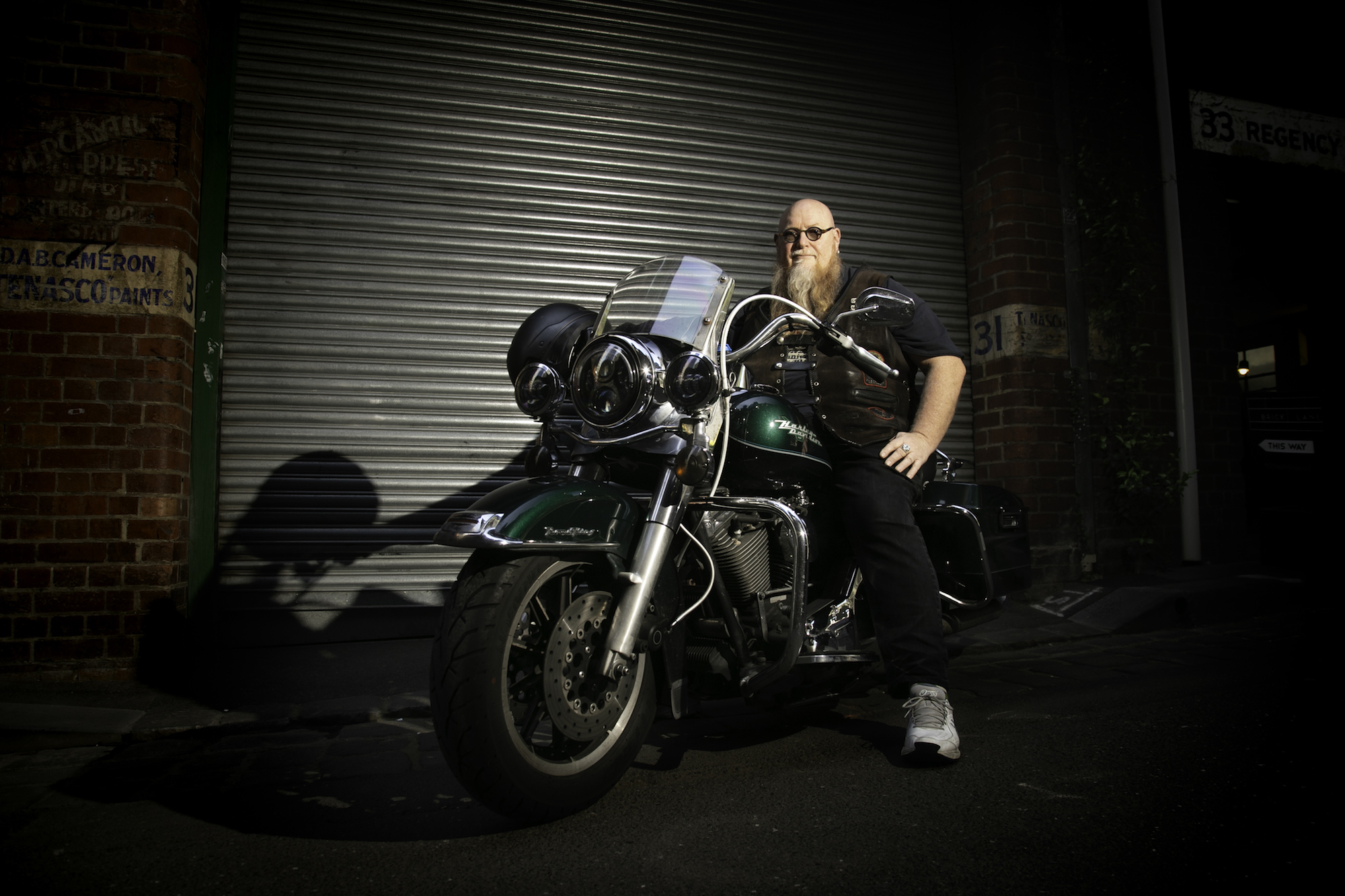
“Many bikies refer to us as priests,” Peter Whitefield says. Image: Carl Rainer
However, it can’t be denied that outlaw motorcycle clubs, some of which were founded by returned soldiers, have often been associated with violence, the most notorious Australian example being the 1984 Milperra Massacre shootout between rival clubs in NSW, which left seven, including one bystander, dead.
Peter said he had never felt personally threatened among bikies, but also knew how to size up situations.
“You’re just aware of your environment and you’re just smart about it,” he said.
“At a clubhouse you never lock your bike because a) it’s safe and b) if you need to get away quickly you can.
“There have been times in days gone past, many, many years ago, where they’ve said ‘there’s something about to happen at this club and we don’t think it’s best if you guys are here’.
“It might be that they’ve got a meeting going on and someone’s about to be thrown out and that sometimes does not end well.
“The only thing we have protecting us from the guys we hang out with is trust and loyalty, and if that’s taken away, we’ve got nothing left. That’s what we trade on; that we are trustworthy.”
In hanging out with outlaw motorcyclists and adopting elements of their style and protocols, it could be asked whether God’s Squad is at risk of being influenced by the bikies, rather than the other way around, but Peter says the boundaries are made clear.
“Bikers are very much aware of the difference between a one per cent club and a Christian motorcycle club,” he said.
“If we behaved and acted as they do they would have absolutely no respect. We are who we are and they are who they are. We understand that and we don’t try to be like them.
“We always have to keep ourselves in check. With God’s Squad we have a group of guys who provide a very strong theological understanding of who we are and what we stand for and part of that would be wrapped up in ‘Jesus Christ, friend of the outcast’.
“It’s a fine line we walk all the time and sometimes we might step over that, but we have ways as a group of bringing ourselves back together.”
One area of outlaw culture that can prove particularly challenging is the traditional proudly ultra-macho chauvinistic ethos that gives women little, or even no, status, reducing them to sexual playthings or even property.
Peter says that the attitudes of bikers towards women can be more nuanced than they appear.
“The role my wife, Ruth, has played has been really important in the journey of Squad for me,” he says.
“We do weddings and funerals together in Squad. We work together as a team. If Ruth doesn’t go to a club with me I always get asked where she is.”
God’s Squad does not allow female members, they are called companions, although women used to be able to wear full colours.
Peter was apologetic about this and says one reason that decision was made was to be consistent internationally, with God’s Squad now operating in a number of countries.
It might be surprising that Peter says his most shocking experiences and stories do not come from being a part of God’s Squad but from his work as a chaplain for the Melbourne Welsh Church, which entails visits to the Malmsbury Youth Detention Centre, and from previous school chaplaincy work.
“Some of the back stories of the boys in youth detention bothers me, some of the stuff around domestic violence and being involved in street gangs often run by adults,” he says.
Not surprisingly, Peter has often been told that he doesn’t look like a chaplain, and indeed once had trouble convincing the police in New Zealand, where he was on his way to attend an outlaw bike club celebration.
“The police had the street shut off and I got pulled over and questioned for an hour and a half,” he says.
“They asked about bikie gangs in NZ and where are you going and what are you doing.
“When they asked what I did for a living, I said ‘I’m actually a school chaplain’ and they didn’t know where to go with that.
“They went ‘a chaplain like we have chaplains’ and I go yeah I work in schools. If you want to know about God’s Squad do a Google search, we’ve got nothing to hide. They let me go. The local police later apologised.”
Peter says that despite being sheep, or you might say Christian lambs, in wolves’ clothing, God’s Squad’s outlaw look generally doesn’t put people off, although some of his migrant Asian neighbours in Maribyrnong “can be a bit frightened until they know who you are”.
“We are always welcome because we are respectful, we are polite to people,” he says.
This is evident before the photoshoot as Peter pilots his big bike up the laneway in a polite, even cheerfully deferential, manner between the curious onlookers, making him seem more like a motorised Santa Claus than a terrifying marauder.
Even the skulls tattooed on Peter’s arm aren’t a celebration of death and darkness, in fact they are the opposite.
They are part of a motif inspired by a verse from Canadian Christian singer Bruce Cockburn, which is paraphrased on the front of Peter’s arm: “Nothing comes without some kind of fight, you have to kick the darkness to make it bleed light.”


